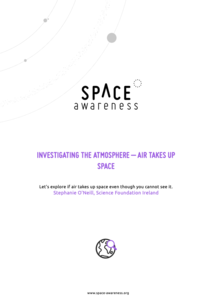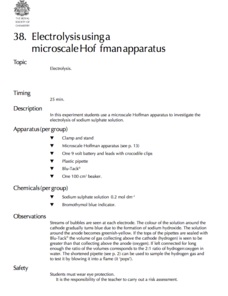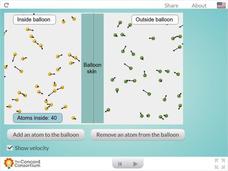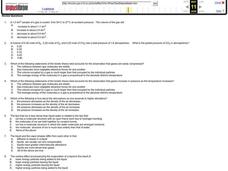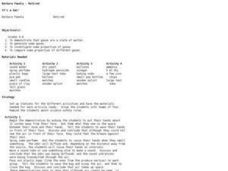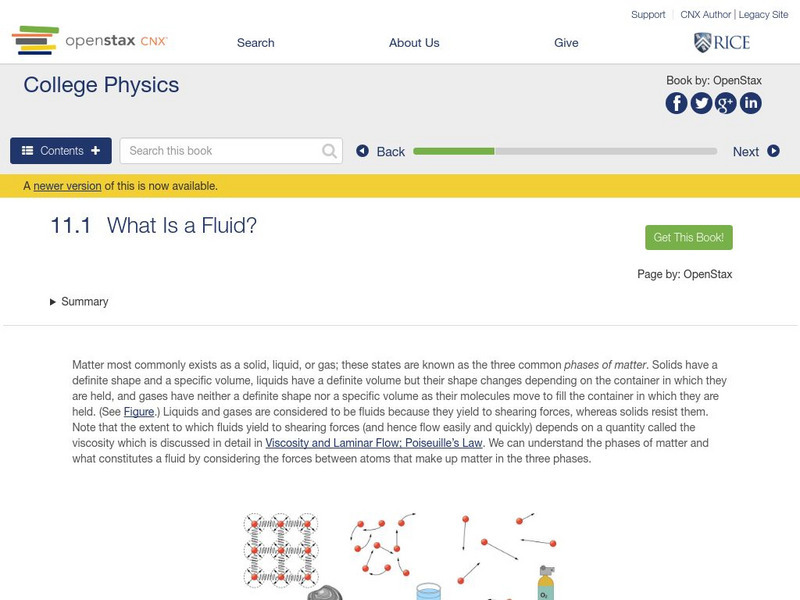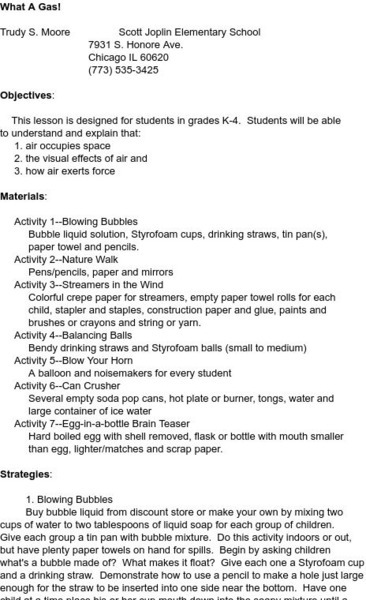Space Awareness
Investigating the Atmosphere - Air Takes Up Space
How do you know there is air? Can you see it, smell it, feel it? To begin the investigation, learners watch a video and discuss what they know about air and the atmosphere. Then, they participate in five different hands-on, inquiry-based...
Space Awareness
Fizzy Balloons - C02 in School
Carbon dioxide is a very important gas; it is present in the air, used in cooking, and supports plant and animal life. Scholars investigate the properties of carbon dioxide with three different activities. They experience a color change,...
Royal Society of Chemistry
Electrolysis Using a Microscale Hoffman Apparatus—Microscale Chemistry
Get big results out of a small-scale lab! Young chemists observe the electrolysis of sodium sulfate using a microscale experiment. A colorful indicator solution combined with the production of gas bubbles yields a variety of observations...
Concord Consortium
Gas Molecules in Motion
Get moving! Science scholars observe the effects of temperature on kinetic energy in an impactful interactive. Individuals control a sliding temperature switch and observe the motion of gas particles that results from the change.
Concord Consortium
What Is Pressure?
Balloons bring great fun to the classroom, until they break. What's a teacher to do then? Break out the balloon of the computer age with a fun interactive! Science scholars add and remove atoms from their virtual balloons and observe...
Chymist
Determination of the Volume of CO2 in Pop Rocks
Where does the pop in pop rocks come from? An engaging activity asks scholars to measure the amount of carbon dioxide in a package of Pop Rocks candy. Learners dissolve the candy in water and use the solubility of CO2 to determine its mass.
Center for Learning in Action
Gases
Explore the properties of gases through one activity and two investigations in which super scientists observe the changes gas makes when encountering different conditions.
SFPOnline
States of Matter Worksheet
Young scientists get to the heart of the matter as they complete this learning exercise on the properties of solids, liquids, and gases.
Curated OER
Phases of Matter
In this matter worksheet, students calculate volume and partial pressure for gases, compare liquid and vapor phases, and review the characteristics properties of gases. This worksheet has 12 multiple choice and 3 problems to solve.
Curated OER
Gas Laws and Alka-Seltzer Rockets
Students investigate the Ideal Gas Law. In this three states of matter lesson, students create Alka-Seltzer rockets using film canisters. Students record observations and data according to the scientific method and explain the gas...
Curated OER
It's a Gas!
Students investigate gases and their properties by completing 4 activities. In this gases lesson plan, students perform activities to show that gases take up space, they diffuse, and that odors and vibrations pass through gases. They...
TED Talks
Ted: Ted Ed: Describing the Invisible Properties of Gas
This video explores how scientists use principles such as gravity to describe and study the properties of gases. [3:27] Followed by a short quiz and a list of additional resources to explore.
Science and Mathematics Initiative for Learning Enhancement (SMILE)
Smile: Gases Lighter and Heavier That Air
Teachers, to demonstrate to the elementary student that some gases are heavier than others, this experiment uses Winnie the Pooh and balloons to do just that.
OpenStax
Open Stax: What Is a Fluid?
From a chapter on Fluid Statics in a Physics textbook. This introductory section of the chapter covers the three common phases of matter, their physical properties, and how atoms are arranged in solids, liquids, and gases. Includes a...
Other
Washington University: Chemistry Behind Airbags
This site from the Chemistry Department at the Washington University provides informaiton on airbags. A lot of gas properties find their way into airbags, and this site goes into a great deal of it. Worth a look for the real world...
Ohio State University
Ohio State University: Properties of Gases
A good introduction to gas properties. Covers general properties and the four variables.
Science and Mathematics Initiative for Learning Enhancement (SMILE)
Smile: What a Gas!
In this lesson plan, students will understand and explain that air occupies space, visual effects of air and how air exerts force.
Simon Fraser University
Chem1 Virtual Textbook: Condensation and the Critical Point
The General Chemistry Virtual Textbook, or Chem 1, is broken into several sections covering various aspects of topics related to chemistry. This section deals with the properties of gases in relation to condensation and the relation of...
PBS
Pbs Teachers: Hot Air Balloon Experiment
Explore how heat affects the density of air by building and flying a hot air balloon using large plastic bags and the hot air from an electric hairdryer.


